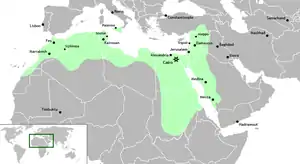909
Year 909 (CMIX) was a common year starting on Sunday (link will display the full calendar) of the Julian calendar.
| Millennium: | 1st millennium |
|---|---|
| Centuries: | |
| Decades: | |
| Years: |
| 909 by topic |
|---|
| Leaders |
|
| Categories |
|
| Gregorian calendar | 909 CMIX |
| Ab urbe condita | 1662 |
| Armenian calendar | 358 ԹՎ ՅԾԸ |
| Assyrian calendar | 5659 |
| Balinese saka calendar | 830–831 |
| Bengali calendar | 316 |
| Berber calendar | 1859 |
| Buddhist calendar | 1453 |
| Burmese calendar | 271 |
| Byzantine calendar | 6417–6418 |
| Chinese calendar | 戊辰年 (Earth Dragon) 3605 or 3545 — to — 己巳年 (Earth Snake) 3606 or 3546 |
| Coptic calendar | 625–626 |
| Discordian calendar | 2075 |
| Ethiopian calendar | 901–902 |
| Hebrew calendar | 4669–4670 |
| Hindu calendars | |
| - Vikram Samvat | 965–966 |
| - Shaka Samvat | 830–831 |
| - Kali Yuga | 4009–4010 |
| Holocene calendar | 10909 |
| Iranian calendar | 287–288 |
| Islamic calendar | 296–297 |
| Japanese calendar | Engi 9 (延喜9年) |
| Javanese calendar | 808–809 |
| Julian calendar | 909 CMIX |
| Korean calendar | 3242 |
| Minguo calendar | 1003 before ROC 民前1003年 |
| Nanakshahi calendar | −559 |
| Seleucid era | 1220/1221 AG |
| Thai solar calendar | 1451–1452 |
| Tibetan calendar | 阳土龙年 (male Earth-Dragon) 1035 or 654 or −118 — to — 阴土蛇年 (female Earth-Snake) 1036 or 655 or −117 |

The Fatimid Caliphate at its greatest extent.
Events
Britain
- King Edward the Elder and his sister, Princess Æthelflæd of Mercia, raid Danish East Anglia and bring back the relics of St. Oswald in triumph. Æthelflæd translates them to the new minster in Gloucester, which is renamed St. Oswald's Priory in his honour.[1]
- Edward the Elder despatches an Anglo-Saxon army to attack the Northumbrian Vikings and ravages Scandinavian York.[2]
Africa
- March 18 – The Fatimid Dynasty founded by Shiite Muslims in Ifriqiya (modern Tunisia) gains suzerainty over the Aghlabid Dynasty in North Africa. Emir Ziyadat Allah III escapes to the Near East, unable to secure any help from the Abbasid Caliphate to regain his emirate.
- The Berber Kutama tribesmen under Abdullah al-Mahdi Billah capture the cities of Kairouan and Raqqada. The capital city of the Rustamid imamate, Tihert is destroyed. The remaining Ibadi are forced into the desert.
- Winter – Abdullah al-Mahdi Billah takes up the leadership of the Fatimid state and proclaims himself Caliph Abdullah (al-Mahdi).
China
- April 27 – The Min Kingdom (modern-day Fujian province) is established by governor Wang Shenzhi (Prince of Langye), with Fuzhou (known as Changle) as its capital. Wang Shenzhi tries to attract scholars who will help to construct an efficient bureaucracy and tax system.
- Battle of Jisu - the warlord brothers Liu Shouguang and Liu Shouwen fight with Liu Shouguang emerging victorious
Mesoamerica
Religion
- Asser, bishop of Sherborne, dies. His See is divided, there are new Bishoprics created at Wells, Crediton, Ramsbury and Sonning.
Births
Deaths
- April 18 – Dionysius II, Syriac Orthodox patriarch of Antioch
- May 9 – Adalgar, archbishop of Bremen
- Aribo of Austria, Frankish margrave
- Asser, bishop of Sherborne (approximate date)
- Cadell ap Rhodri, king of Seisyllwg (Wales)
- Cerball mac Muirecáin, king of Leinster (Ireland)
- Fujiwara no Tokihira, Japanese statesman (b. 871)
- Gerald of Aurillac, Frankish nobleman (b. 855)
- Luo Yin, Chinese statesman and poet (b. 833)
- Muhammad ibn Dawud al-Zahiri, Muslim theologian (b. 868)
- Sochlachan mac Diarmata, king of Uí Maine (Ireland)
- Wighelm, bishop of Selsey
References
- Heighway, Carolyn (2001). "Gloucester and the new minister of St Oswald". In Higham, N. J.; Hill, D. H. (eds.). Edward the Elder 899-924. Routledge. p. 108.
- John Haywood (1995). Historical Atlas of the Vikings, p. 68. Penguin Books: ISBN 978-0-140-51328-8.
This article is issued from Wikipedia. The text is licensed under Creative Commons - Attribution - Sharealike. Additional terms may apply for the media files.